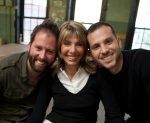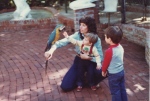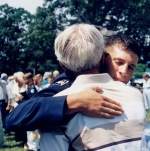 My journal entry, February 23, 1999, 6:45 am: I went to an Al-Anon meeting last night, and I found a peace that has eluded me. I’m truly amazed that my soul quieted there, in the basement of a church. What made the difference? I heard such pain from others, and I listened intently as to how they are struggling to survive. I saw in their eyes a determination to get healthy, their intense love for their alcoholic or addict, and true compassion for each other. Yes, something happened last night. Many of them have worse pain than I, and all seem to struggle with similar issues – worry, fear and detachment. I can find strength in their strength. Maybe I’ve been searching for someone to give me strength. Maybe I can find strength and comfort in Al-Anon and ultimately in myself.
My journal entry, February 23, 1999, 6:45 am: I went to an Al-Anon meeting last night, and I found a peace that has eluded me. I’m truly amazed that my soul quieted there, in the basement of a church. What made the difference? I heard such pain from others, and I listened intently as to how they are struggling to survive. I saw in their eyes a determination to get healthy, their intense love for their alcoholic or addict, and true compassion for each other. Yes, something happened last night. Many of them have worse pain than I, and all seem to struggle with similar issues – worry, fear and detachment. I can find strength in their strength. Maybe I’ve been searching for someone to give me strength. Maybe I can find strength and comfort in Al-Anon and ultimately in myself.
An Open Letter to Chrissy and Lisa, September 28, 2011, 4:47 PM: Thanks for reaching out to me and inviting me to your Al-Anon meetings. Your generosity of spirit and your compassion touched me.
So what is it that keeps me coming back? When I look around the room, I see people who understand where I’ve been and how I’ve suffered. When I share our story, people look at me with understanding. When I leave, I don’t feel stripped and vulnerable, but I feel elevated, heard and supported.
Magic happens in these Al-Anon meetings. Here we find hope. I’m remain a grateful member of Al-Anon.








6 Comments.
View Comments | Leave a Comment